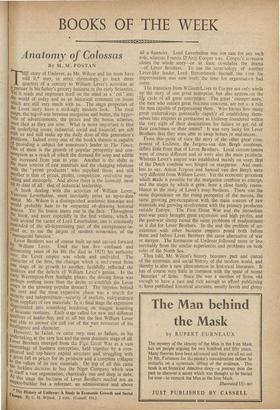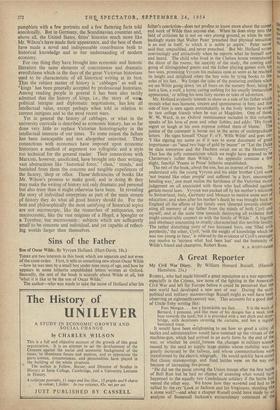Anatomy of Colossus
By M. M. POSTAN THE story of Unilever, as Mr. Wilson and his team have told it,* may, in strict chronology, go back three quarters of a century to William Lever's activities as Yet Partner in his father's grocery business in the early Seventies. Yet it reads and impresses itself on the mind as a ' cut' into the world of today and as an historical comment on issues Which are still very much with us. The stage properties of the Lever story have a strikingly modern look. The rival soaps, the tug-of-war between margarine and butter, the hyper- bola of advertisements, the prizes and the bonus schemes, were then as they are now. What is more important is that the underlying issues, industrial, social and financial, are still With 'us and still make up the daily dose of this generation's Problems. Indeed every one of the book's themes is capable of providing a subject for tomorrow's leader in The Times. one of them is the growth of popular prosperity and con- sumption as a result of which the demand for soap and edible fats increased from year to year. Another is the shifts in the main sources of raw materials and the changing relations With the ' prime producers' who supplied them: and still another is that of prices, profits, competition, restrictive mar- keting and monopoly. And above them is the leitmotif, most 1113 to date of all: that of industrial leadership. ‘,i/‘ book dealing with the activities of William Lever,o vscount Leverhulme, must inevitably point an up-to-date moral. Mr. Wilson is a distinguished academic historian and would probably hate to be suspected of• drawing historial lessons. Yet his lesson stares one in the face. Throughout the book, and more especially in the first volume, which is Guilt around the career of Lord Leverhulme, one is constantly reminded of the all-determining part of the entrepreneur-in- Ilief or, to use the jargon of modern economics, of the managerial function.' , Lever Brothers was of course built up and carried forward °Y William Lever. Until the last five confused and threatening years of. his life (he died in 1925) his authority over the Lever empire was whole and undivided. The character of the firm, the changes which it underwent from °lie stage of its growth to another, faithfully reflected the qualities and the defects of William Lever's genius. In the early Warrington-Port Sunlight phases the driving force was Perhaps nothing more than the desire to estab!ish the Lever sPaPs in the growing popular demand. The impetus behind the next and the most expansive phase was a search for security and independence—security of markets. independence from suppliers of raw materials. In its final stage the expansion degenerated into something bordering on magpie hoarding ()f business ventures. Each stage called for new and different qualities of leadernhip, and at all but the last William Lever Y`'as able to answer the call out of the vast resources of his Intelligence and character. However, he failed, or came very near to failure, in his 1,111dertaking at the very last and the most dramatic stage of all. '-ever Brothers emerged from the F;;;st Great War as a vast assemblage of business enterprises, held together by a com- plicated and top-heavy capital structure and struggling with a great fall in prices for its products and a complete collapse ;1,2 1the. values of its raw materials. On top of all this came 'Io feckless decision to buy the Niger Company which wag to itself a vast organisation, chaotically run and deep in debt. At this stage the business of Lever Brothers needed not an empire-builder but a reformer, an administrator and above ,* The History of Unilever: A Study in Economic Growth and Social Change. By C. H. Wilson. 2 vols. (Casscll 45s.) all a financier. Lord Leverhulme was not cast for any such role, whereas Francis D'Arcy Cooper was. Cooper's accession closes the whole .story—or at least concludes the drama —of Lever Brothers. To use the terminology of another Lever-like leader, Lord Beaverbrook himself, the line for improvisation was now over, the time for organisation had come.
The transition from William Lever to Cooper not only winds up the story of one great enterprise, but also epitom..ses the lift'; cycle of all great enterprises. The great entreprcieurs.' the men who initiate great business concerns, are not a.; a rule the men capable of perpetuating them. Who knows how many great undertakings potentially capab:e of establishing them- selves into empires as permanent as Unilever foundered within the very sight of their destinations for failure to get rid of their coachmen or their teams? It was very lucky for Lever Brothers that they were able to swap horses in midstream.
From this point of view the story of the other great com- ponent of Unilever, the Jurgens-van den Bergh combines, differs little from that of Lever Brothers. Local circumttances were of course different and so were also the main products. Whereas Lever's empire was established mainly on soap, that of the Dutch combine was hinged on margarine. And need- less to say, Anton Jurgens and Samuel van den Bergh were very different from William Lever. Yet the economic processes which made it possible for the margarine combine to emerge, and the stages by which it grew, bore a close family resem- blance to the story of Lever's soap business. There was the same dependence on the rising prosperity of the masses, the same growing pre-occupation with the main sources of raw materials and growing involvement with the primary producers outside Europe. The First Great War and the immediate post-war years brought great expansion and high profits, and the post-war slump raised the same problems of readjustment as it did for Lever Brothers. In the end the problem of co- existence with other business empires posed both before them and before Lever Brothers the same alternative of war or merger. The formation of Unilever followed more or less inevitably from the similar experiences and problems on both sides of the North Sea.
Thus told, Mr. Wilson's history becomes part and parcel of the economic and social history of the modern world, and thereby is also a new phenomenon in historical literature. It has of course very little in common with the spate of recent histories' of firms. Since the war a number of firms, old enough to have a past and rich enough to afford publicising it, have published historical accounts, mostly lavish and glossy pamphlets with a few portraits and a few flattering facts told anecdotally. But in Germany, the Scandinavian countries and, above all, the United States, firms' histories much more like Mr. Wilson's have made their appearance, and the best of them have made a novel and indispensable contribution both to historical knowledge and to ?Jur understanding of modern economy.
For one thing they have brought into economic and historic literature the same elements of concreteness and dramatic eventfulness which in the days of the great Victorian historians used to be characteristic of all historical writing at its best. What the subject matter of history is ` cabbages' as well as kings' has been generally accepted by professional historians. Among reading people in general it has been also tacitly admitted that the history .of kings, i.e., the story of watt, political intrigue and diplomatic negotiations, has lost all intellectual value, except perhaps when told in relation to current intrigues and to the most recent wars.
Yet in general the history of cabbages, or what in the university curricula is described as economic history, has so far done very little to replace Victorian historiography in the intellectual interests of our times. To some extent the failure has been inescapable and not altogether uninvited. Their connections with economics have imposed upon economic historians a method of argument too syllogistic and a style too technical for the general reader. Their connections with Marxists, however, unsolicited, have brought into their writings vast abstractions like ` historical force,' class," trends,' and banished from them the concrete and tangible experiences of the factory, 'shop or office. These"deficiencies of books like Mr. Wilson's promise to make good; and in doing st they may make the writing of history not only dramatic and personal but also truer than it might otherwise have been. In revealing the story of individual enterprises as part of the main stream of history they do 'what all good history should do. For the best and philosophically the most satisfying of historical topics are not microscopic, like the researches of antiquaries, nor macrocosmic, like the vast enigmas of a Hegel, a Spengler or a Toynbee, but microcosmic: subjects which are sufficiently small to be concrete and individual, and yet capable of reflect- ing worlds larger than themselves.



































 Previous page
Previous page